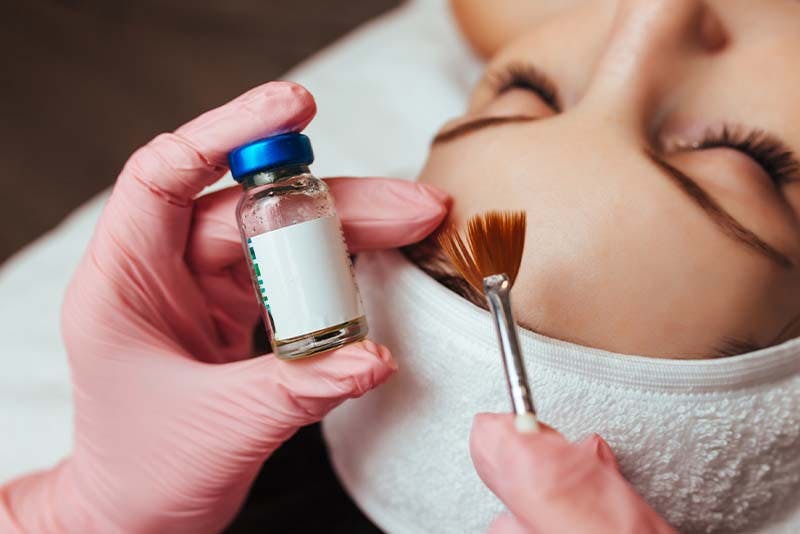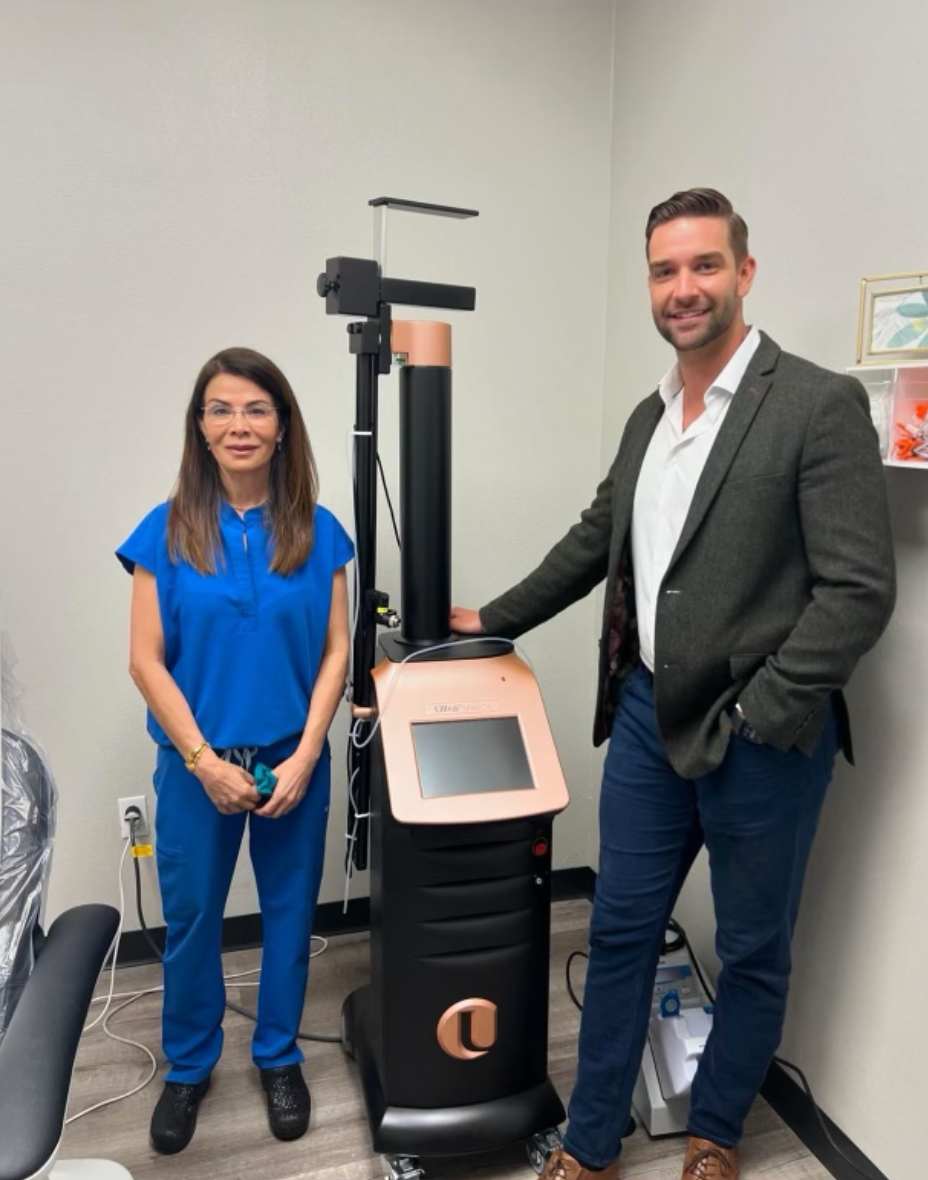Chemical peels are a powerful and versatile tool in skincare, offering a solution to a variety of concerns, from fine lines and wrinkles to acne scars and hyperpigmentation. They work by applying a chemical solution to the skin, which causes the outer layer to peel away, revealing fresher, smoother, and more youthful-looking skin underneath. With different types of chemical peels available, this treatment can be customized to address your specific skin needs. In this blog, we'll explore how chemical peels work, the different types available, and the incredible benefits they offer.
How Do Chemical Peels Work?
A chemical peel involves applying a carefully formulated acid solution to the skin’s surface. This solution penetrates the top layers of the skin, causing controlled damage that triggers the body’s natural healing response. As the skin heals, the damaged outer layer peels away, allowing new skin cells to emerge. This process promotes collagen production and stimulates cell turnover, which helps to address a wide range of skin concerns.
Depending on the strength and type of peel used, the depth of skin penetration can vary. Some peels only target the very top layer of the skin (the epidermis), while others reach the deeper layers (the dermis), offering more dramatic results.
Types of Chemical Peels
There are three main types of chemical peels: superficial, medium, and deep. Each type serves a different purpose, and the choice depends on your skin concerns and desired results.
- Superficial Peels: Also known as “lunchtime peels,” these are the mildest type of chemical peels. They use mild acids like alpha-hydroxy acid (AHA) or glycolic acid to gently exfoliate the outer layer of the skin. Superficial peels are great for improving skin texture, brightening the complexion, and treating mild acne.
- Medium Peels: These peels penetrate deeper into the skin, targeting both the epidermis and the upper dermis. They often use trichloroacetic acid (TCA) or stronger AHAs. Medium peels are ideal for treating more significant concerns like sun damage, pigmentation, and fine lines.
- Deep Peels: These peels are the most intensive and can penetrate the lower dermal layers. They often use phenol or a higher concentration of TCA. Deep peels are used to treat severe wrinkles, deep scars, or precancerous growths. Because they require a longer recovery time, deep peels are typically reserved for more severe skin issues.
Benefits of Chemical Peels
Chemical peels offer a range of benefits that go beyond surface-level improvements. Here are some of the key advantages:
- Exfoliates Dead Skin Cells: By removing the top layers of dead skin, chemical peels reveal fresher, brighter skin. This exfoliation process also helps to improve the skin’s texture and overall appearance, giving you a smoother, more even complexion.
- Improves Skin Tone and Pigmentation: Chemical peels are highly effective at addressing uneven skin tone, dark spots, and hyperpigmentation. They help to fade sun damage, melasma, and post-inflammatory hyperpigmentation (such as dark marks left behind by acne). With regular treatments, chemical peels can significantly reduce discoloration, leaving you with a more even skin tone.
- Reduces Fine Lines and Wrinkles: As we age, our skin's natural collagen production slows down, leading to the formation of fine lines and wrinkles. Chemical peels help stimulate collagen production, which improves skin elasticity and reduces the appearance of fine lines. Medium and deep peels, in particular, can target deeper wrinkles and provide long-lasting results.
- Treats Acne and Reduces Acne Scars: Chemical peels are excellent for treating acne-prone skin. The acids in the peel help to unclog pores, reduce inflammation, and kill acne-causing bacteria. They also promote skin regeneration, which helps to reduce the appearance of acne scars over time. For individuals dealing with both active breakouts and post-acne marks, chemical peels offer a dual benefit.
- Minimizes Large Pores: By removing dead skin cells and stimulating cell turnover, chemical peels can help shrink the appearance of large pores. This results in smoother, more refined skin, which can also help prevent future breakouts.
- Boosts Skincare Product Effectiveness: One of the often-overlooked benefits of chemical peels is their ability to enhance the effectiveness of your at-home skincare routine. By removing the top layer of dead skin, your products can penetrate deeper into the skin, allowing them to work more effectively. This means your moisturizers, serums, and treatments can deliver better results.
What to Expect During and After a Chemical Peel
During a chemical peel, the solution is applied to your skin and left on for a specific amount of time, depending on the type of peel. You might feel a mild tingling or stinging sensation during the treatment, but this is usually brief. After the treatment, the skin may appear red or flushed, similar to a mild sunburn.
Over the next few days, the outer layer of your skin will begin to peel off, and you’ll notice your skin becoming smoother and brighter. For superficial peels, recovery time is minimal, with only light peeling or flaking. Medium and deep peels may require more downtime, as they involve deeper exfoliation and more significant peeling.
It’s important to protect your skin from the sun after a chemical peel, as your skin will be more sensitive to UV rays. Applying a broad-spectrum sunscreen with a high SPF is crucial for maintaining your results and preventing future damage.
Is a Chemical Peel Right for You?
Chemical peels are suitable for most skin types and can be customized to address specific concerns. Whether you’re dealing with acne, fine lines, or pigmentation, there’s likely a peel that’s right for you. However, it’s important to consult with a skincare professional before undergoing a chemical peel to ensure it’s appropriate for your skin type and goals.
Conclusion
Chemical peels are a fantastic way to rejuvenate your skin, tackle specific concerns, and reveal a healthier, more youthful complexion. Whether you’re looking for a quick pick-me-up with a superficial peel or need more significant results with a medium or deep peel, this treatment offers transformative benefits.
If you’re interested in exploring chemical peels, schedule a consultation with us to learn which type of peel is best suited for your skin’s needs. Let’s help you achieve the radiant, glowing skin you deserve!


